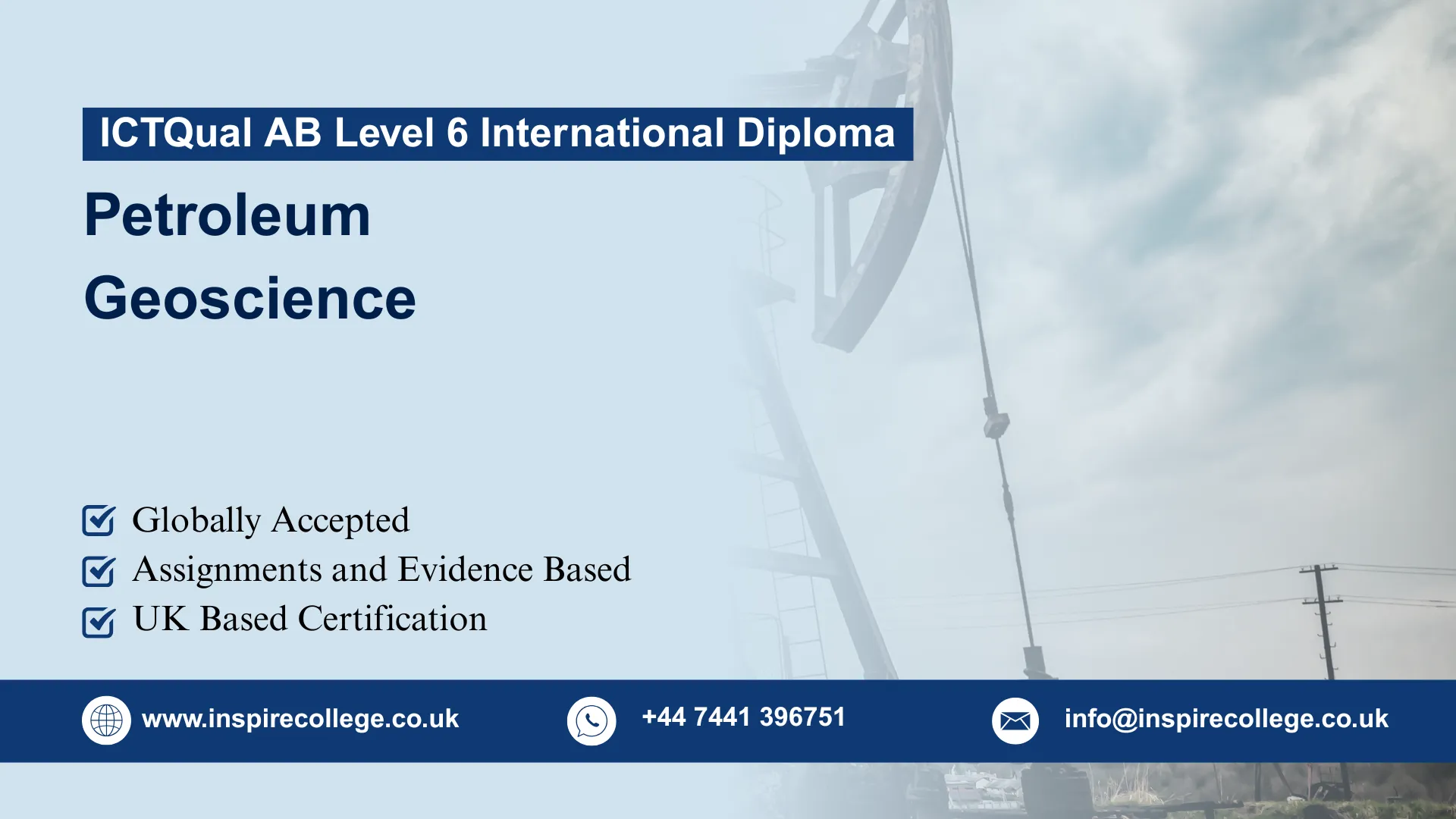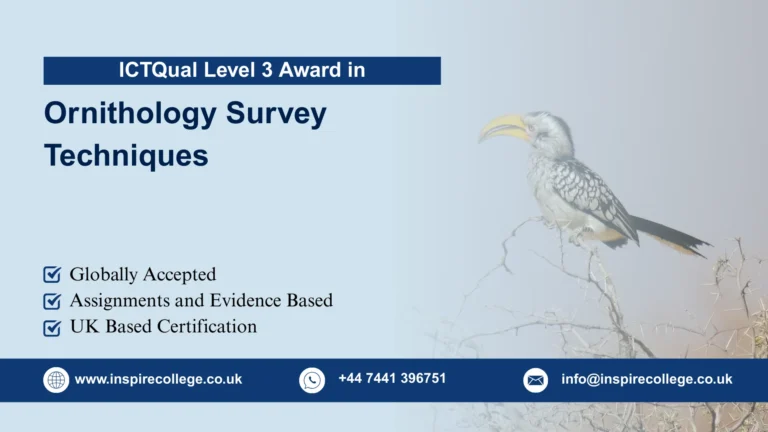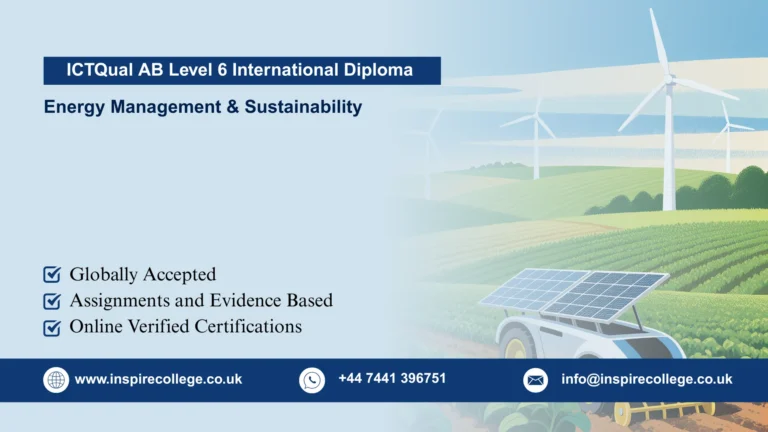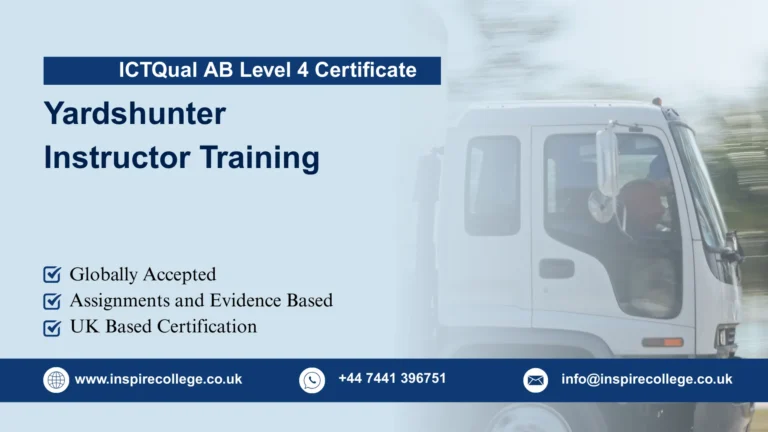
ICTQual AB Level 6 International Diploma in Petroleum Geoscience
The ICTQual AB Level 6 International Diploma in Petroleum Geoscience is a globally recognised qualification designed for learners aspiring to excel in the oil and gas sector, with a focus on exploration, reservoir analysis, and geoscientific techniques. This comprehensive programme equips learners with advanced knowledge, practical skills, and strategic insight required to evaluate petroleum resources, manage exploration projects, and support decision-making in energy operations.
Structured as a three-year, 360-credit programme, the diploma covers foundational geoscience principles, intermediate exploration techniques, and advanced petroleum system analysis. Learners gain expertise in areas such as geological mapping, reservoir characterisation, seismic interpretation, wellsite geology, and emerging technologies in petroleum geoscience. The programme is ideal for fresh learners aiming to start a career in geoscience and petroleum exploration, as well as experienced professionals seeking internationally recognised certification to validate and enhance their expertise.
By enrolling in this diploma, learners develop critical skills in data analysis, resource estimation, risk assessment, and project management, enabling them to make informed technical and operational decisions in exploration and production environments. The course also emphasises communication, teamwork, and professional ethics, preparing learners for leadership and specialist roles in geoscience projects globally.
Graduates of the ICTQual AB Level 6 Diploma are well-positioned to pursue careers in petroleum exploration, reservoir management, seismic analysis, wellsite geology, and energy consultancy, both in the UK and internationally. With a combination of practical training, theoretical knowledge, and industry-relevant skills, this diploma provides a globally recognised pathway for learners seeking advanced career opportunities in petroleum geoscience and the wider oil and gas industry.
To enrol in the ICTQual AB Level 6 International Diploma in Petroleum Geoscience, learners must meet the following criteria:
- Age Requirement: Learners must be at least 18 years old at the time of enrolment.
- Educational Qualifications: Applicants should hold a Level 5 Diploma, Higher National Diploma (HND), or equivalent in geoscience, petroleum engineering, geology, or related disciplines. Fresh learners with strong foundational knowledge in earth sciences or energy studies may also be considered.
- Professional Experience (Optional): While not mandatory, learners with 1–2 years of relevant experience in petroleum exploration, reservoir analysis, or geological projects are encouraged to apply to enhance practical understanding.
- English Language Proficiency: Learners must demonstrate proficiency in English through IELTS (5.5 or above), TOEFL, or an equivalent recognised qualification, ensuring effective engagement with course materials, assignments, and assessments.
- Technical Aptitude: Learners should have basic knowledge of geological principles, mathematics, and technical problem-solving to successfully undertake advanced modules in petroleum geoscience.
- Registration Requirement: All learners must register with our ICTQual AB Approved Training Centre to access course materials, learning support, and assessment guidance.
By meeting these entry requirements, learners will be fully prepared to undertake this three-year, 360-credit programme, developing the analytical, technical, and project management skills required to excel in petroleum geoscience roles both in the UK and internationally.
Mandatory Units
This qualification, the ICTQual AB Level 6 International Diploma in Petroleum Geoscience, consists of 36 mandatory units.
Year 1 – Foundation in Petroleum Geoscience
- Principles of Geology and Earth Sciences
- Introduction to Petroleum Exploration
- Mineralogy and Petrology
- Sedimentology and Stratigraphy
- Geophysical Methods in Exploration
- Introduction to Reservoir Engineering
- Drilling Operations Fundamentals
- Petroleum Fluid Properties
- Geoscience Data Collection Techniques
- Health, Safety, and Environmental Awareness
- Scientific Report Writing
- Introduction to Geospatial Technology
Year 2 – Intermediate Petroleum Geoscience
- Structural Geology and Tectonics
- Advanced Sedimentary Basin Analysis
- Reservoir Characterisation and Modelling
- Petrophysics and Well Logging
- Seismic Interpretation and Geophysics
- Drilling Fluid and Wellbore Stability
- Production Systems and Flow Mechanics
- Hydrocarbon Exploration Techniques
- Risk Assessment and Project Management
- Environmental Impact and Sustainability
- GIS Applications in Petroleum Geoscience
- Technical Communication and Data Analysis
Year 3 – Advanced Petroleum Geoscience
- Advanced Reservoir Simulation
- Enhanced Oil Recovery Techniques
- Petroleum Economics and Project Evaluation
- Exploration Strategy and Field Development
- Advanced Geophysics and Seismic Modelling
- Subsurface Fluid Flow and Reservoir Dynamics
- Drilling Design and Well Planning
- Petroleum Laboratory Techniques
- Energy Transition and Sustainable Practices
- Research Methods in Geoscience
- Capstone Project in Petroleum Geoscience
- Professional Development and Leadership in Energy
Learning Outcomes for the ICTQual AB Level 6 International Diploma in Petroleum Geoscience:
Year 1 – Foundation in Petroleum Geoscience
Principles of Geology and Earth Sciences
- Understand the basic principles of geology and Earth sciences.
- Explain rock formation processes, plate tectonics, and geological cycles.
- Apply foundational knowledge to identify geological structures and formations.
Introduction to Petroleum Exploration
- Comprehend the petroleum exploration process from discovery to production.
- Identify key geological and geophysical indicators for hydrocarbon presence.
- Recognise the roles of exploration teams and industry practices.
Mineralogy and Petrology
- Analyse mineral compositions and rock textures.
- Classify igneous, sedimentary, and metamorphic rocks.
- Apply mineralogical knowledge to petroleum geology contexts.
Sedimentology and Stratigraphy
- Understand sedimentary processes and depositional environments.
- Interpret stratigraphic sequences and basin evolution.
- Apply stratigraphic principles to hydrocarbon exploration.
Geophysical Methods in Exploration
- Describe geophysical techniques used in petroleum exploration.
- Interpret basic seismic, magnetic, and gravity data.
- Understand the limitations and advantages of different methods.
Introduction to Reservoir Engineering
- Explain fundamental reservoir concepts and properties.
- Understand fluid flow in porous media.
- Identify reservoir types and their characteristics.
Drilling Operations Fundamentals
- Describe drilling rig components and operations.
- Understand drilling techniques and wellbore construction.
- Recognise operational safety and regulatory considerations.
Petroleum Fluid Properties
- Analyse the physical and chemical properties of hydrocarbons.
- Understand phase behaviour and fluid classification.
- Apply knowledge to reservoir and production contexts.
Geoscience Data Collection Techniques
- Understand methods for field and laboratory data collection.
- Interpret geological, geophysical, and petrophysical datasets.
- Apply data collection best practices in exploration projects.
Health, Safety, and Environmental Awareness
- Recognise health and safety hazards in petroleum operations.
- Understand environmental protection practices and compliance requirements.
- Promote safe and sustainable operational culture.
Scientific Report Writing
- Develop skills for preparing clear and concise scientific reports.
- Communicate technical findings effectively to stakeholders.
- Apply proper referencing, structure, and presentation standards.
Introduction to Geospatial Technology
- Understand GIS principles and applications in petroleum geoscience.
- Analyse spatial data for exploration and reservoir management.
- Apply geospatial tools to real-world scenarios.
Year 2 – Intermediate Petroleum Geoscience
Structural Geology and Tectonics
- Interpret geological structures and tectonic settings.
- Analyse deformation patterns affecting reservoirs.
- Apply structural concepts to exploration and production planning.
Advanced Sedimentary Basin Analysis
- Assess basin formation and evolution.
- Interpret sedimentary facies and reservoir potential.
- Apply basin analysis for hydrocarbon prospect evaluation.
Reservoir Characterisation and Modelling
- Construct detailed reservoir models using geological and petrophysical data.
- Evaluate reservoir heterogeneity and performance.
- Apply modelling techniques for production optimisation.
Petrophysics and Well Logging
- Understand petrophysical properties and measurement techniques.
- Interpret well logs to evaluate reservoir quality.
- Integrate petrophysical data into exploration and production decisions.
Seismic Interpretation and Geophysics
- Analyse seismic data for structural and stratigraphic interpretation.
- Identify hydrocarbon traps and potential drilling targets.
- Apply geophysical methods in exploration projects.
Drilling Fluid and Wellbore Stability
- Understand drilling fluid types and their functions.
- Analyse wellbore stability challenges and mitigation methods.
- Apply fluid management strategies to drilling operations.
Production Systems and Flow Mechanics
- Comprehend reservoir-to-surface production systems.
- Analyse fluid flow behaviour in wells and pipelines.
- Apply production optimisation techniques.
Hydrocarbon Exploration Techniques
- Evaluate exploration methodologies and workflows.
- Identify potential hydrocarbon accumulations.
- Apply exploration planning and risk assessment.
Risk Assessment and Project Management
- Understand risk identification, analysis, and mitigation in projects.
- Apply project management principles to petroleum operations.
- Integrate technical and financial considerations in planning.
Environmental Impact and Sustainability
- Assess environmental impacts of exploration and production.
- Understand sustainable practices and regulatory compliance.
- Implement environmental management strategies.
GIS Applications in Petroleum Geoscience
- Analyse geospatial datasets for reservoir and exploration studies.
- Apply GIS tools for mapping and spatial analysis.
- Integrate GIS into decision-making processes.
Technical Communication and Data Analysis
- Develop advanced data analysis skills for petroleum geoscience.
- Present technical information effectively to diverse audiences.
- Apply statistical and computational tools to geoscience datasets.
Year 3 – Advanced Petroleum Geoscience
Advanced Reservoir Simulation
- Conduct dynamic reservoir simulations for production forecasting.
- Analyse reservoir performance under various development scenarios.
- Apply simulation results to optimise recovery strategies.
Enhanced Oil Recovery Techniques
- Understand EOR methods and principles.
- Evaluate the applicability of thermal, chemical, and gas injection techniques.
- Integrate EOR strategies into reservoir management plans.
Petroleum Economics and Project Evaluation
- Assess financial viability of petroleum projects.
- Apply cost-benefit analysis, NPV, and IRR calculations.
- Integrate economic factors into exploration and production decisions.
Exploration Strategy and Field Development
- Design exploration campaigns and field development plans.
- Evaluate technical, economic, and operational feasibility.
- Apply strategic thinking for optimal resource extraction.
Advanced Geophysics and Seismic Modelling
- Apply advanced geophysical modelling techniques.
- Interpret complex seismic datasets for exploration insights.
- Integrate geophysical data into reservoir evaluation.
Subsurface Fluid Flow and Reservoir Dynamics
- Analyse multiphase fluid flow in reservoirs.
- Evaluate pressure, saturation, and reservoir connectivity.
- Apply principles to production optimisation and reservoir management.
Drilling Design and Well Planning
- Design wells considering geological and operational constraints.
- Plan drilling programmes and assess associated risks.
- Apply wellbore design principles to maximise safety and efficiency.
Petroleum Laboratory Techniques
- Conduct laboratory analysis of rock and fluid samples.
- Interpret experimental results for reservoir characterisation.
- Apply laboratory techniques to support field operations.
Energy Transition and Sustainable Practices
- Understand energy transition trends and alternative resources.
- Apply sustainability principles to petroleum operations.
- Develop strategies for reducing environmental impact.
Research Methods in Geoscience
- Apply scientific research methodologies to geoscience projects.
- Conduct literature reviews, data collection, and analysis.
- Present research findings effectively to technical and non-technical audiences.
Capstone Project in Petroleum Geoscience
- Integrate knowledge from previous units to complete a comprehensive project.
- Analyse real-world challenges and propose evidence-based solutions.
- Demonstrate problem-solving, critical thinking, and professional skills.
Professional Development and Leadership in Energy
- Develop leadership and management skills in petroleum and energy sectors.
- Enhance communication, teamwork, and decision-making abilities.
- Prepare for professional career advancement and industry engagement.
The ICTQual AB Level 6 International Diploma in Petroleum Geoscience is designed for learners who aspire to build a successful career in petroleum exploration, reservoir analysis, and geoscience-driven oil and gas operations. The programme is suitable for both fresh learners and experienced professionals seeking internationally recognised certification.
Professional Background
- Graduates or professionals in geoscience, petroleum engineering, geology, or related fields.
- Individuals aiming for careers in petroleum exploration, reservoir management, wellsite geology, or energy consultancy.
- Learners seeking to transition into technical, analytical, or supervisory roles in oil and gas operations.
Key Interests
- Passion for petroleum exploration, reservoir analysis, and geoscientific research.
- Interest in integrating geological data, seismic interpretation, and technical modelling for resource evaluation.
- Desire to apply scientific knowledge and project management to real-world oil and gas challenges.
Skills and Attributes
- Strong analytical, problem-solving, and data interpretation abilities.
- Effective communication, teamwork, and project management skills.
- Ability to apply safety, environmental, and regulatory compliance standards.
- Competence in using geological modelling software, data analysis tools, and digital technologies for petroleum geoscience.
Career Goals
- Aspiring to roles such as Petroleum Geoscientist, Reservoir Engineer, Exploration Analyst, or Wellsite Geologist.
- Seeking to manage exploration projects, perform reservoir characterisation, and contribute to strategic decision-making in oil and gas operations.
- Keen to develop practical expertise in seismic interpretation, resource estimation, and emerging petroleum technologies.
Learning Motivation
- Learners committed to completing the three-year, 360-credit programme to acquire advanced technical knowledge and practical skills.
- Individuals aiming to gain a globally recognised qualification to enhance employability, professional credibility, and international career mobility.
By completing this diploma, learners will gain the technical, analytical, and project management skills required to excel in petroleum geoscience and oil and gas operations, positioning themselves as competent professionals in a competitive global industry.
As an ICTQual AB Approved Training Centre, we offer learners two flexible pathways to achieve the Level 6 International Diploma in Petroleum Geoscience. All learners must register with our centre to enrol and access course materials.
Route 1 – Experienced Professionals
- Designed for learners with at least 6 years of verifiable professional experience in petroleum exploration, reservoir analysis, or related geoscience roles.
- Learners submit evidence of prior projects, responsibilities, and achievements demonstrating competence in geoscientific analysis, reservoir evaluation, and project management.
- Our centre evaluates the learner’s existing skills and knowledge against the diploma’s learning outcomes.
- Targeted guidance or additional training is provided if gaps are identified.
- Successful verification results in diploma certification without completing all 36 assignments, enabling fast-tracked recognition of expertise.
Route 2 – Fresh Learners
- Designed for learners without prior professional experience in petroleum geoscience or related fields.
- Learners must complete the full three-year, 360-credit programme, including all 36 assignments, case studies, and practical assessments.
- Assessments are structured to demonstrate both theoretical knowledge and practical application of skills in real-world petroleum geoscience projects.
- Upon successful completion, learners are awarded the ICTQual AB Level 6 International Diploma in Petroleum Geoscience.
Both routes provide a globally recognised, industry-relevant qualification, enabling learners to either validate their professional experience or gain comprehensive expertise to advance their careers in petroleum geoscience and the wider oil and gas industry.
Register Now
FAQs for ICTQual AB Level 6 International Diploma in Petroleum Geoscience






